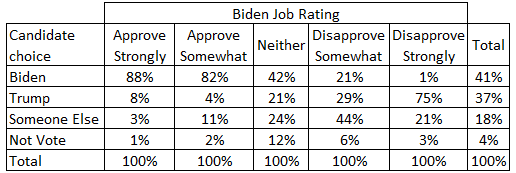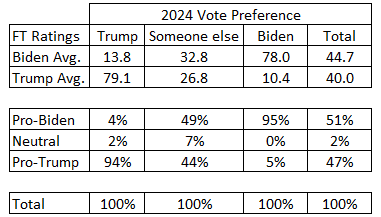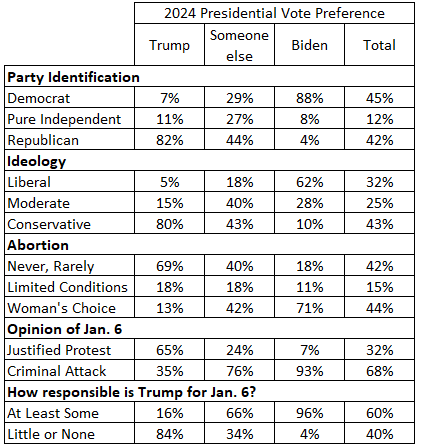KEY POINTS FROM THIS ARTICLE
— Joe Biden’s approval numbers are weak and are reminiscent of the numbers from some recent presidents who lost reelection.
— However, Biden is still very competitive in polling with the current leader for the Republican presidential nomination, Donald Trump, in part because voters still have less negative attitudes toward him than they do toward Trump, according to the 2022 American National Elections Studies Pilot Study.
— A key bloc of voters who would prefer someone other than Biden or Trump skew conservative, but are also alienated by Trump’s actions around the events of Jan. 6, 2021.
2024’s decisive cross-pressured voters
Joe Biden recently announced that he would seek a second term as president in the 2024 election. Biden, who is already the oldest person ever to serve in the White House, will be almost 82 years old on Election Day 2024. He would be 86 at the end of his second term in January 2029.
According to recent polling, the large majority of Americans view Biden’s age as a major concern. Beyond concerns about his age, Biden enters the last two years of this first term with an approval rating that has been stuck in the low 40s for months. An incumbent president with an approval rating well below 50% would normally be considered an underdog to win a second term. Other first-term incumbents with approval ratings below 50%, including Jimmy Carter, George H.W. Bush, and Donald Trump, were defeated.
Despite Biden’s advanced age and low approval rating, however, he currently appears to have a reasonable chance of winning a second term. According to a recent average of national polls, Biden is tied with the candidate who currently holds a wide lead in preferences for the GOP nomination among Republican voters, former President Donald Trump. Biden also holds narrow leads in several swing states including Michigan, Pennsylvania, Wisconsin, Arizona, and Georgia.
To shed light on Joe Biden’s chances of winning a second term in 2024, I undertook an analysis of data from the 2022 American National Election Studies Pilot Study. This was an online survey conducted by YouGov in November 2022 based on an opt-in sample designed to represent the voting-age population of the United States. In addition to questions about respondents’ political attitudes and voting behavior in the 2022 midterm election, the survey included an extensive battery of questions about a possible 2024 rematch between Joe Biden and Donald Trump.
Biden, Trump or someone else?
According to the data from the ANES Pilot Study, President Biden’s approval rating was well underwater among registered voters in November 2022: only 40% approved of his performance compared with 50% who disapproved and 10% who were undecided. Moreover, of the 50% who disapproved of Biden’s performance, 41% strongly disapproved while of the 40% who approved of Biden’s performance, only 19% strongly approved.
There was a sharp divide in opinions of Biden’s performance along party lines with Democratic identifiers and leaners approving by a margin of 75% to 12% and Republican identifiers and leaners disapproving by a margin of 89% to 8%. However, only 38% of Democrats strongly approved of Biden’s performance while 81% of Republicans strongly disapproved of his performance. In addition, pure independents disapproved of Biden’s performance by a margin of 55% to 24% with 40% strongly disapproving and only 7% strongly approving.
Table 1: 2024 presidential vote intention by Biden job rating

Note: Columns may not add up to 100% due to rounding error
Source: 2022 ANES Pilot Study
Given Biden’s dismal approval ratings, it is somewhat surprising that, when given a choice between the incumbent and Trump, registered voters favored Biden over Trump by a margin of 41% to 37%. Table 1 displays the preferences of registered voters broken down by their opinions of Biden’s approval rating. The results show that Biden held wide leads over Trump among those who either strongly or somewhat approved of his performance. Trump held a large lead among those who strongly disapproved of Biden’s performance. However, Biden led Trump among those who neither approved nor disapproved of Biden’s performance, and Trump only held a narrow lead among those who somewhat disapproved of Biden’s performance.
Perhaps the most striking finding regarding voter preferences in a Biden-Trump rematch is that 18% of registered voters indicated that that would vote for “someone else” even though no other options were provided. Fully 44% of voters who somewhat disapproved of Biden’s performance indicated that they would vote for someone else compared with only 29% who favored Trump and 21% who favored Biden.
Biden’s narrow lead over Trump among registered voters in the ANES Pilot Study was based on a wide lead among those approving of his job performance and weak support for Trump among those who were undecided or somewhat disapproved of Biden’s performance. To better understand the voters who preferred someone else to Biden or Trump, I examined feeling thermometer ratings of both candidates in relation to 2024 candidate preference. These are ratings of candidates on a scale ranging from zero (very cold) to 100 (very warm). A rating of 50 degrees is considered “neutral.” The results are displayed in Table 2.
Table 2: Biden and Trump feeling thermometer ratings by 2024 presidential vote preference

Note: Columns may not add up to 100% due to rounding error
Source: 2022 ANES Pilot Study
Relative feeling thermometer ratings are typically very strongly related to voting preferences. We can therefore use these ratings to predict how voters who currently prefer another alternative would choose between Biden and Trump in a two-way contest. The results in Table 2 indicate that both Biden and Trump were rather unpopular. Biden received an average rating of 44.7 degrees while Trump received an average rating of 40.0 degrees on the feeling thermometer. Among all registered voters, 51% rated Biden more favorably than Trump while 47% rated Trump more favorably than Biden.
Voters who preferred someone else in 2024 disliked both Biden and Trump, giving Biden an average rating of 32.8 degrees and Trump an average rating of 26.8 degrees on the feeling thermometer. However, these voters rated Biden more favorably than Trump by a margin of 49% to 44%. In the absence of another alternative, it appears that more of these disgruntled voters would opt for Biden than for Trump.
Table 3: Attitudes of voters who prefer Trump, Biden, or someone else in 2024

Note: Columns may not add up to 100% due to rounding error
Source: 2022 ANES Pilot Study
Who are these disgruntled voters and why do they narrowly prefer Biden to Trump in a direct comparison? Table 3 presents a breakdown of selected attitudes of voters based on their 2024 presidential vote preference. The data indicate that a plurality of these disgruntled voters were self-identified conservatives who either identified with or leaned toward the Republican Party. Only 29% were Democrats and only 18% described themselves as liberal. They were almost evenly divided between those favoring more liberal and more restrictive abortion policies.
Given the partisan and ideological leanings of the “someone else” voters, one might expect them to rate Donald Trump more positively than Joe Biden. However, the data in Table 3 suggest that another set of attitudes explain their very negative ratings of the former president — their reactions to the Jan. 6, 2021 insurrection and Donald Trump’s role in the events that led up to that day. In contrast to Trump supporters, those who favored someone else in 2024 overwhelmingly considered the events of Jan. 6 to be a “criminal attack” rather than a “justified protest.” Moreover, two-thirds of those who favored someone else viewed Trump as having at least some responsibility for the attack on the Capitol — an opinion shared by 96% of Biden supporters but only 16% of Trump supporters.
Conclusions
Most Americans do not want to see a rematch between Joe Biden and Donald Trump in 2024. Both Biden and Trump are viewed unfavorably by a majority of voters. Nevertheless, there is a strong likelihood that Biden and Trump will be the Democratic and Republican candidates in 2024. In that case, a group of voters who currently favor “someone else” in 2024 may decide the outcome of the presidential election. These voters make up close to one-fifth of the electorate according to data from the 2022 ANES Pilot Study.
According to the data from the ANES Pilot Study, Joe Biden would appear to have a small advantage over Donald Trump in a two-way contest: 51% of registered voters rated Biden more favorably than Trump while 47% rated Trump more favorably than Biden on a feeling thermometer scale. Among those who preferred “someone else” in 2024, 49% rated Biden more favorably while 44% rated Trump more favorably.
A plurality of voters who prefer someone other than Trump or Biden in 2024 identify as conservative and identify with or lean toward the Republican Party. The key factor driving these voters toward Biden appears to be their concern about the events of Jan. 6, 2021 and the former president’s role in inciting the riot at the U.S. Capitol.
Given the unpopularity of both Biden and Trump, there would appear to be an opening for a third party or independent candidate in 2024 who would appeal to the substantial minority of voters, 15% in the ANES Pilot Study, who dislike both major-party candidates. In 2020, however, third party and independent candidates won less than 2% of the national popular vote. Whether any strong third party or independent candidates emerge in 2024 and, if so, which major party candidate’s support they cut into, may well decide the outcome of the presidential election.
 Alan I. Abramowitz is the Alben W. Barkley Professor of Political Science at Emory University and a senior columnist with Sabato’s Crystal Ball. His latest book, The Great Alignment: Race, Party Transformation, and the Rise of Donald Trump, was released in 2018 by Yale University Press. Alan I. Abramowitz is the Alben W. Barkley Professor of Political Science at Emory University and a senior columnist with Sabato’s Crystal Ball. His latest book, The Great Alignment: Race, Party Transformation, and the Rise of Donald Trump, was released in 2018 by Yale University Press. |
